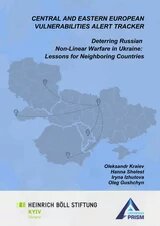Central and Eastern European Vulnerabilities Alert Tracker
The paper researches the vulnerabilities of the mentioned states to Russian hybrid and non-linear aggression. Additionally, the project focuses on analysing the strategies and tactics that Ukraine has effectively deployed in countering similar threats and evaluating how these countermeasures can serve as adaptable models for bolstering defense of Ukraine’s neighbouring states.
The project baseline is that despite its full-scale aggression against Ukraine, Russia does not reduce but strengthens its hybrid warfare against both Ukraine and Europe, primarily Ukraine’s neighbouring EU states and the Republic of Moldova (which has been especially relevant before and after the European Parliament elections, the full cycle of elections in Romania, presidential elections in the Republic of Moldova and Slovakia, and local elections in Poland). These political events present critical junctures where the vulnerabilities of these states are most exposed, making them more susceptible to Russian disinformation, manipulation of public opinion, and other tactics typical for hybrid and non-linear warfare.
The paper researches the vulnerabilities of the mentioned states to Russian hybrid and non-linear aggression. Additionally, the project focuses on analysing the strategies and tactics that Ukraine has effectively deployed in countering similar threats and evaluating how these countermeasures can serve as adaptable models for bolstering defense of Ukraine’s neighbouring states. This aspect is particularly significant, given Ukraine’s frontline experience with Russian aggression, which is providing a unique and tested set of countermeasures.
The framework of the project envisions a series of semi-structured interviews with experts from each of the target countries for verification and approbation of the gathered data and highlighting the priority areas of the research.
The list of experts for the interviews was formed from among the analysts as well as current and former practioners in the field of foreign policy and national security in respective countries. All of them represent different organizations and institutions and possess a unique set of skills and experiences valuable in the context of the implementation of the project.
Overall, 12 interviews have been held, with three interviews per each of the target countries. The interviews were conducted over the period from the 4th of July to the 15th of September 2024.
The interviews were focused on unveiling the threats and vulnerabilities faced by the target countries, the ways in which Russia utilizes or might utilize them in hybrid and non-linear aggression tactics, and how Ukrainian experience in opposing such tactics could be applied for its Central and Eastern European neighbours.
During this research, the main attention was paid to the correlation between Ukraine’s existing experience in the field of resistance to potential threatening actions of the Russian Federation and the existing framework—actual and legally established—for resistance to Russian disinformation and illegal influences in the countries that became the subject of this study. Thus, it is planned to highlight what experience within the last 10 years of active Ukrainian resistance to the negative informational and hybrid actions of the Russian Federation can be applied in the context of each individual case of a Central and Eastern European country.
It is also important to note that the involvement of people with a military background in this project and an understanding of the intricacies of the specifically military application of informational and hybrid components of the aggressive foreign policy of the Russian Federation made it possible to significantly strengthen the expert and analytical component of this work. In fact, this concerns not just the expansion of the subject horizon, but a deeper understanding of the real state of affairs and possible forecasting of their further development.
Separately, we should note that in due to security restrictions and national security issues that inevitably arise when working with information and expertise of this nature, within the scope of this study, only the conclusions, which publication and dissemination will not pose additional threats to the national security of Ukraine and the countries considered within the scope of this work, are presented. Additionally, these circumstances forced us to quote the interviewed experts under anonimously.
The following country cases are presented in alphabetical order, so this particular composition of the text does not represent a part of the findings and/or any specific significance attributed to a particular country.
